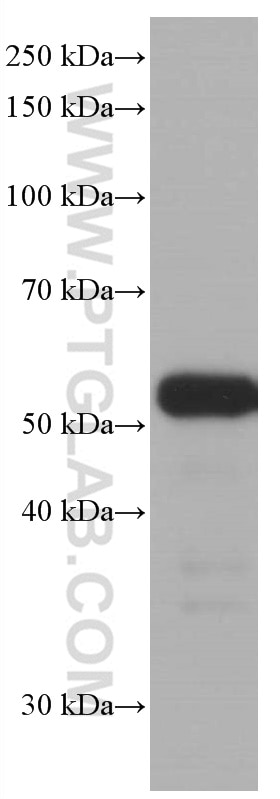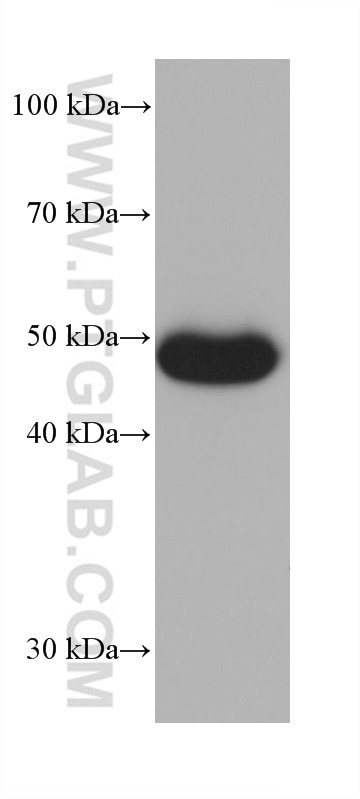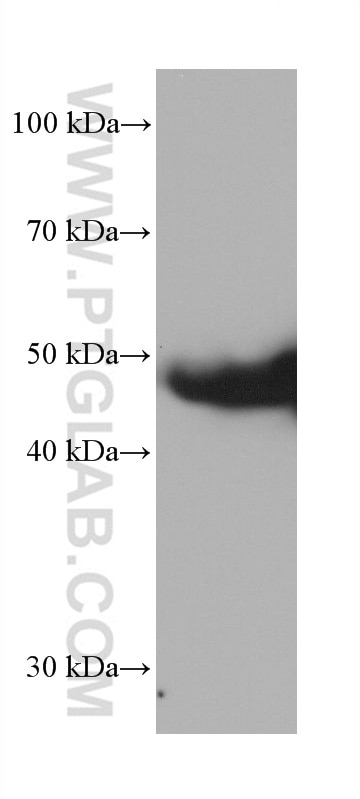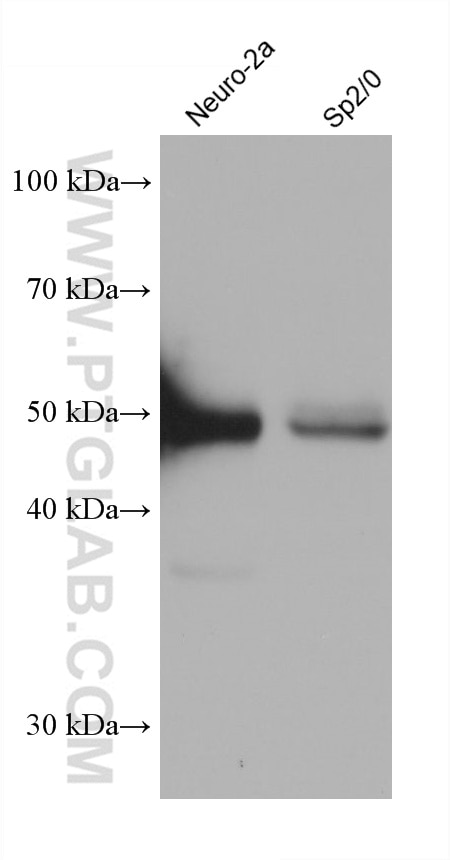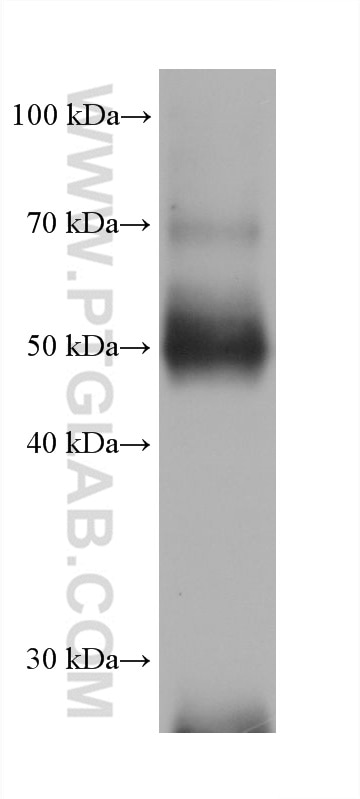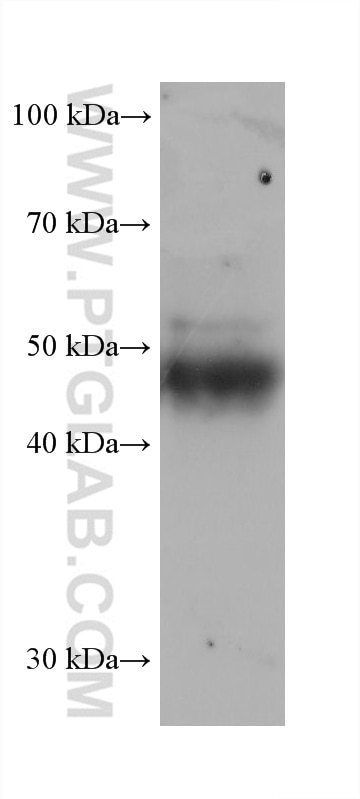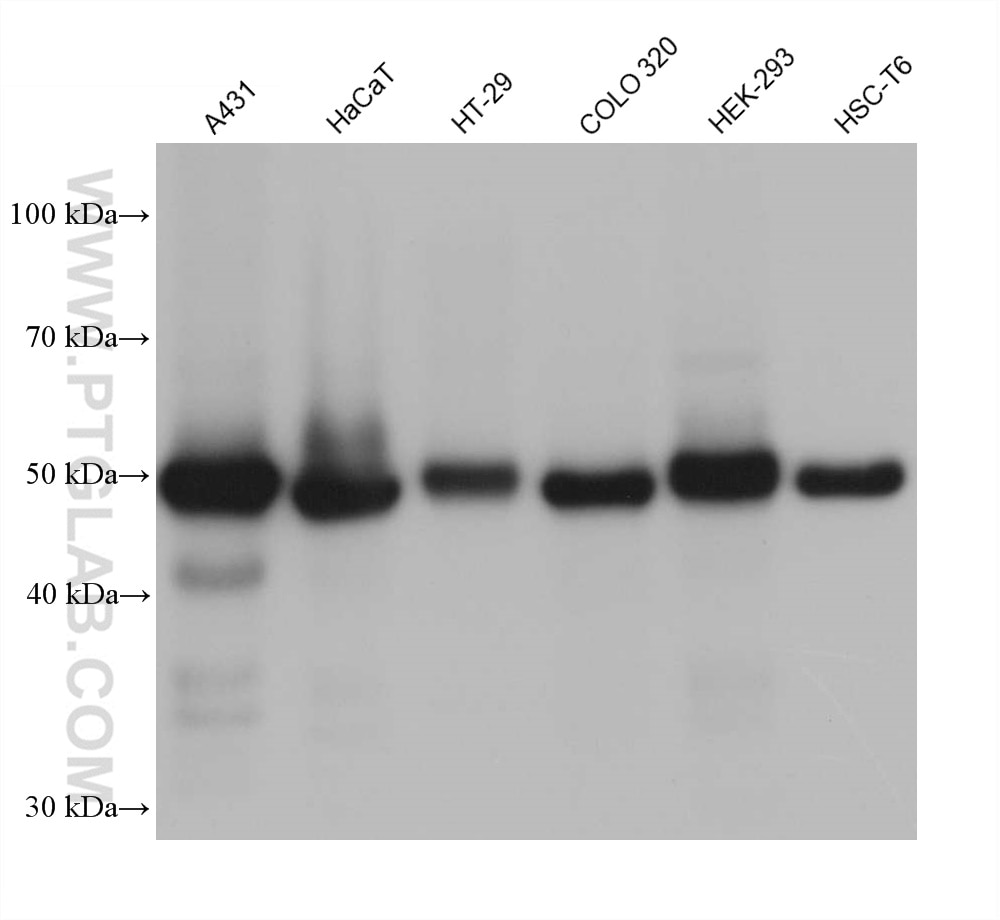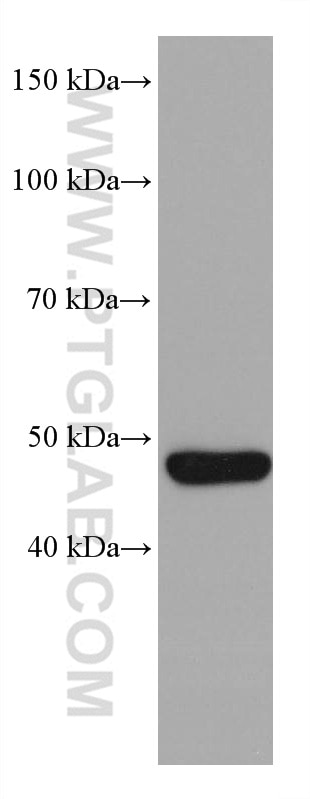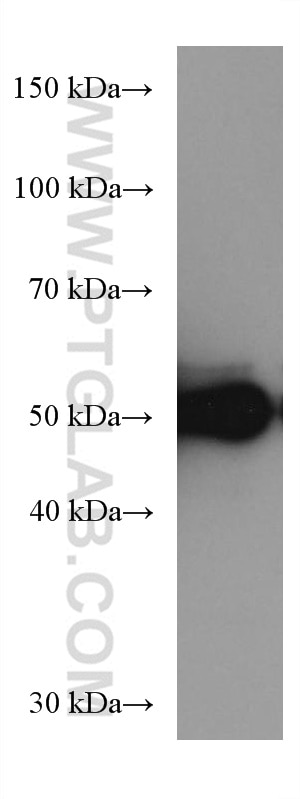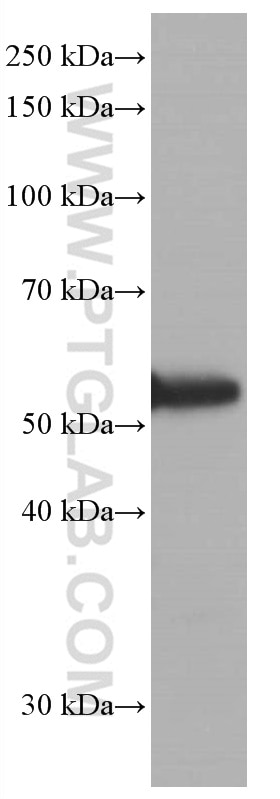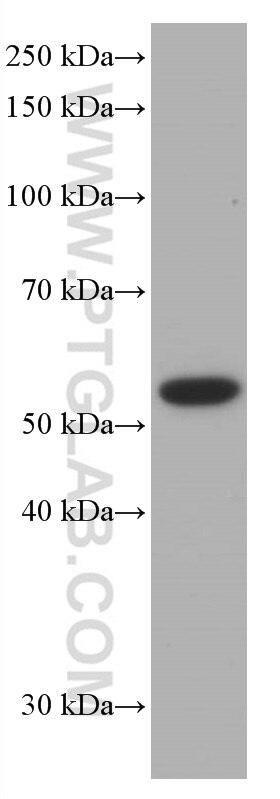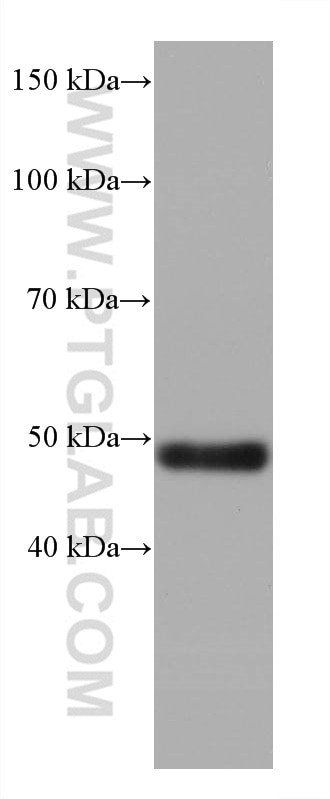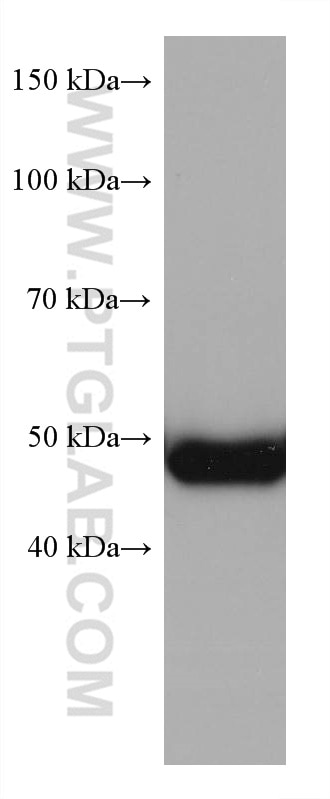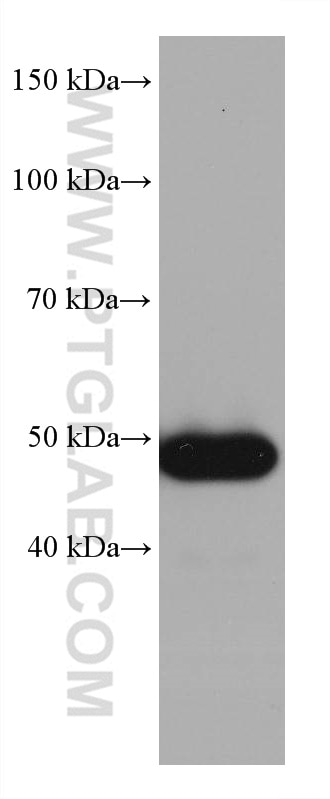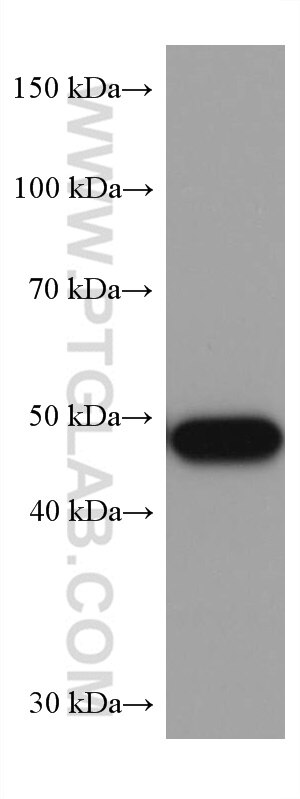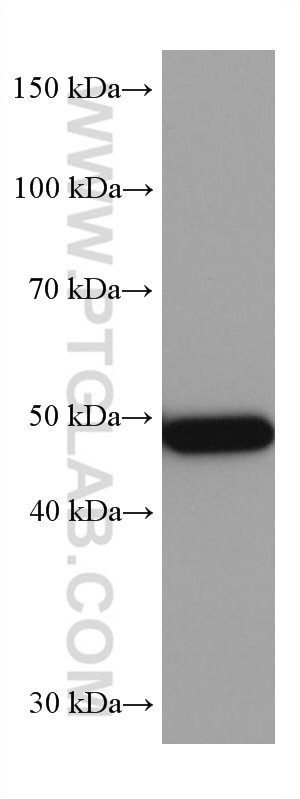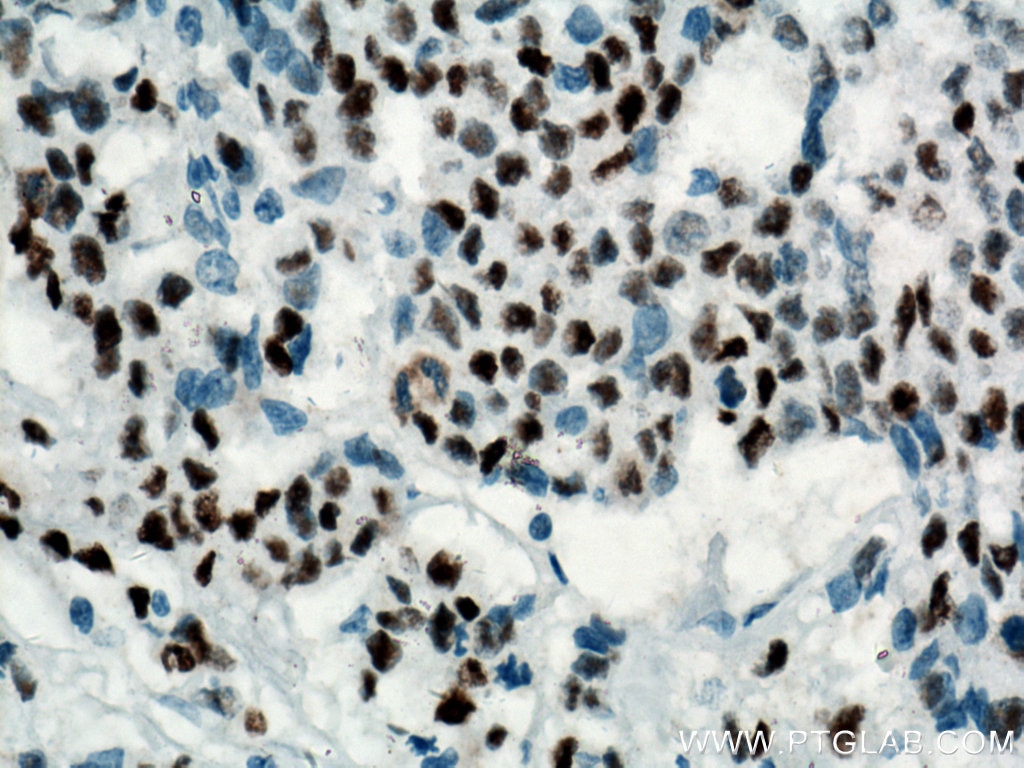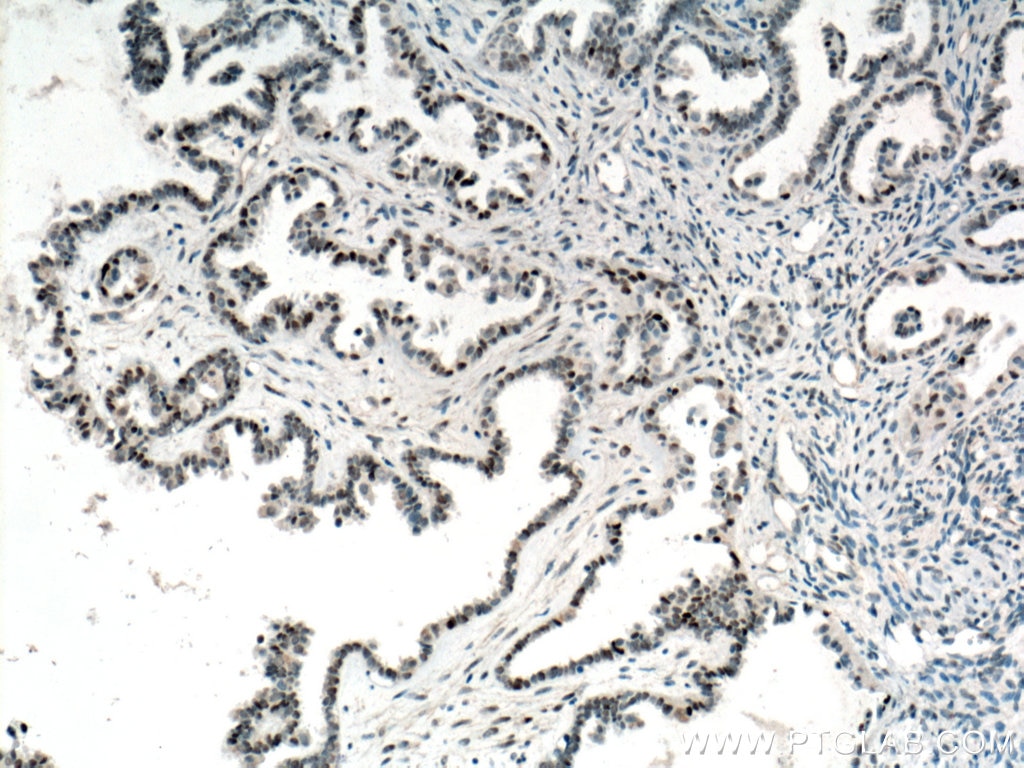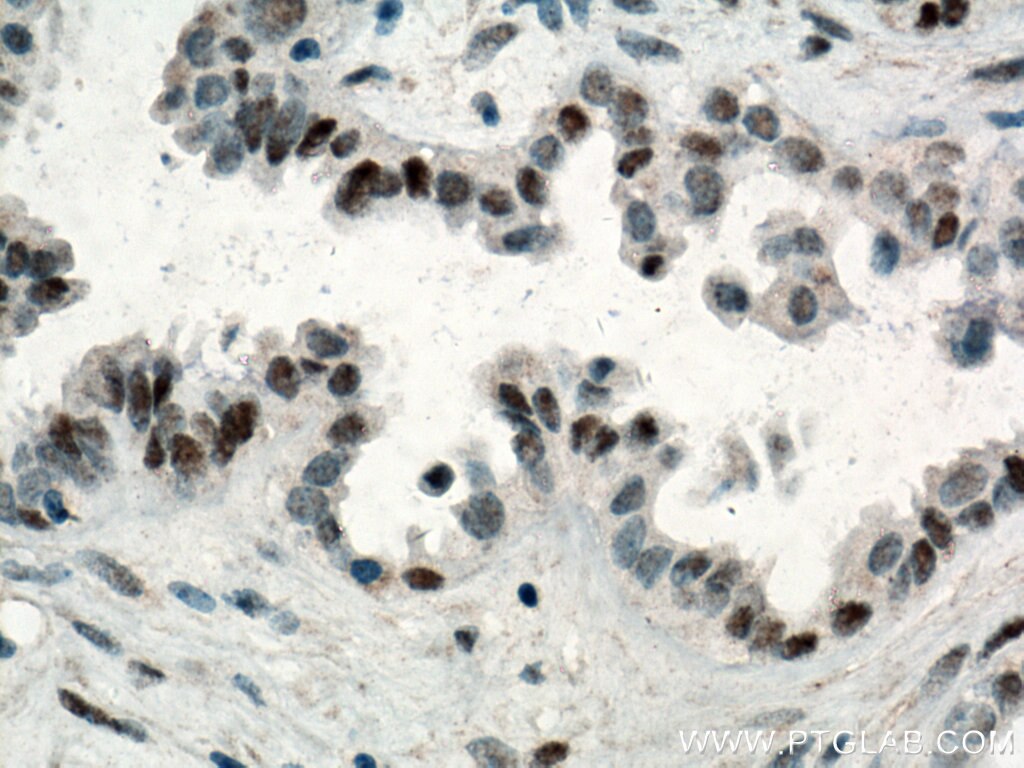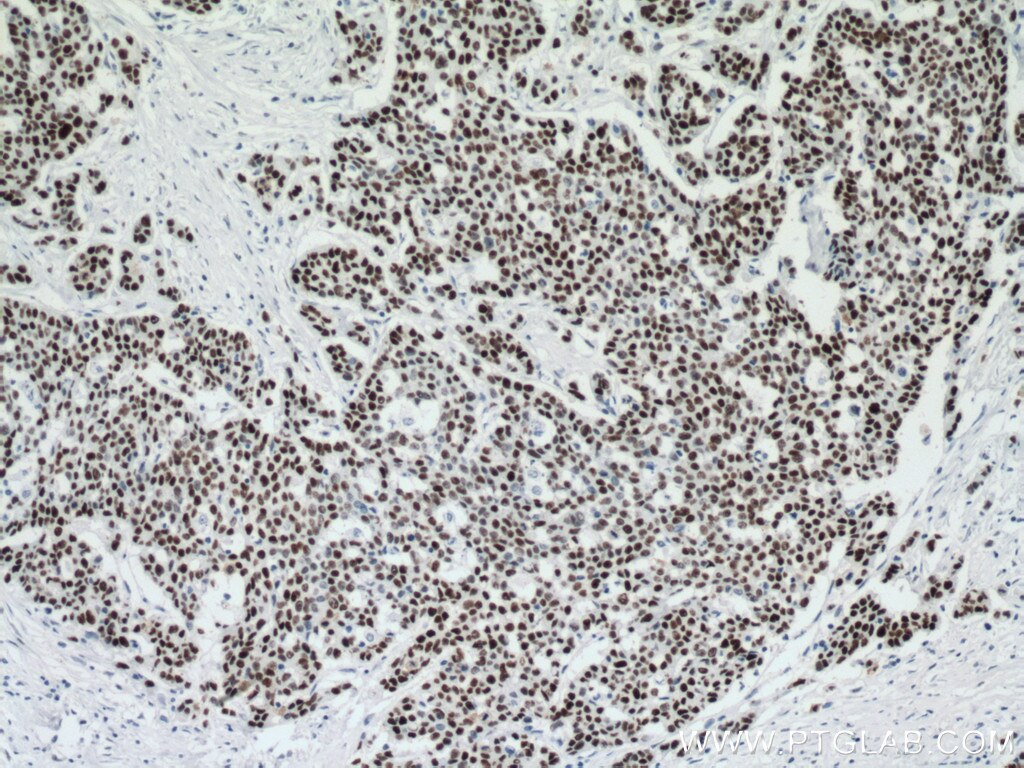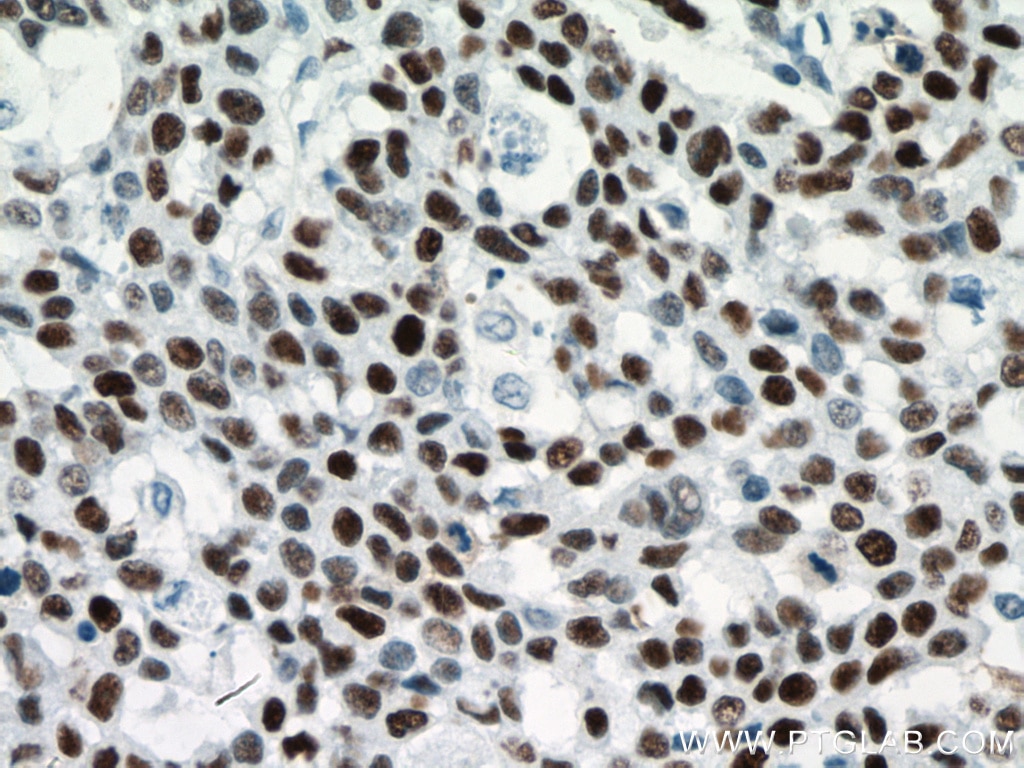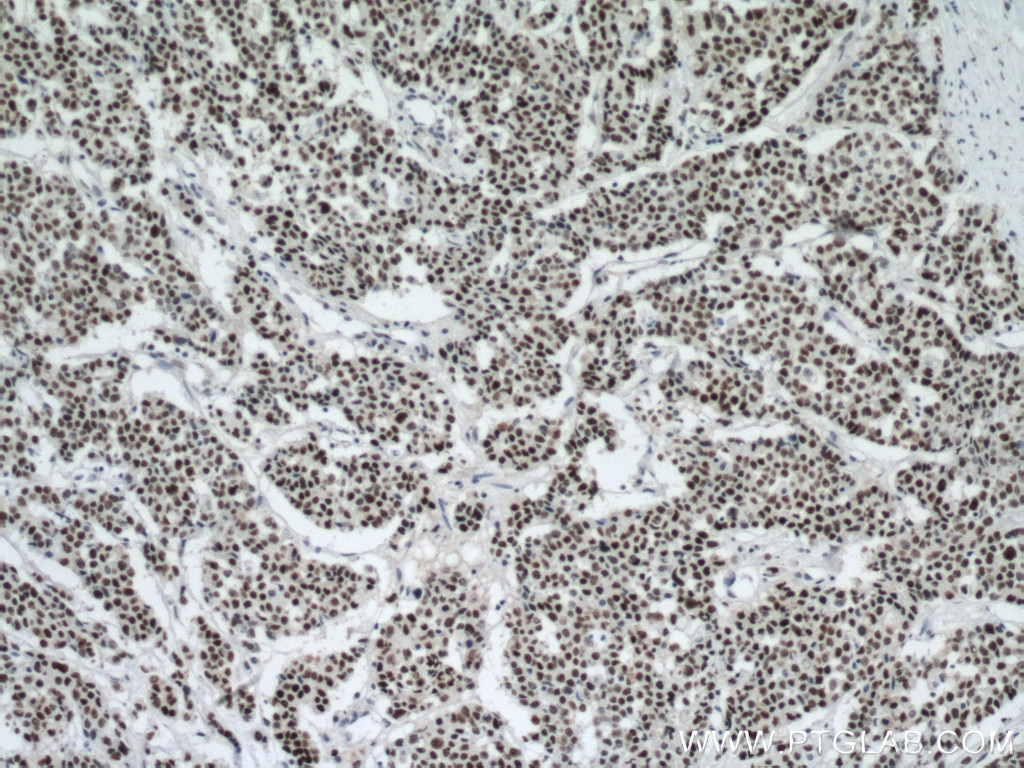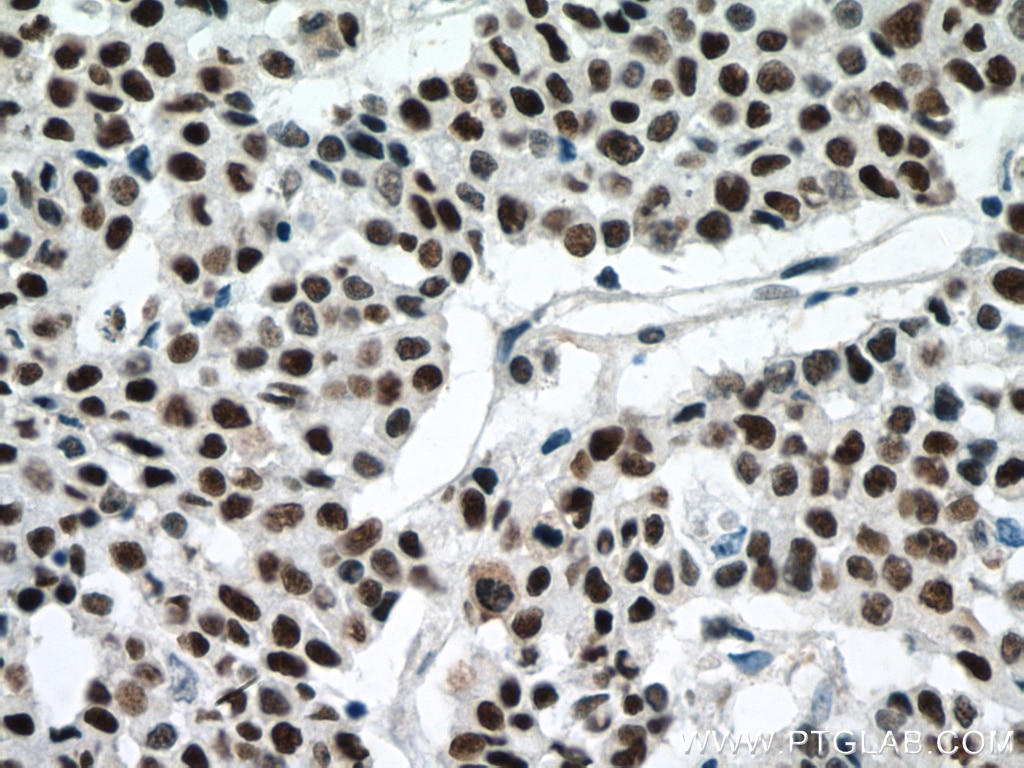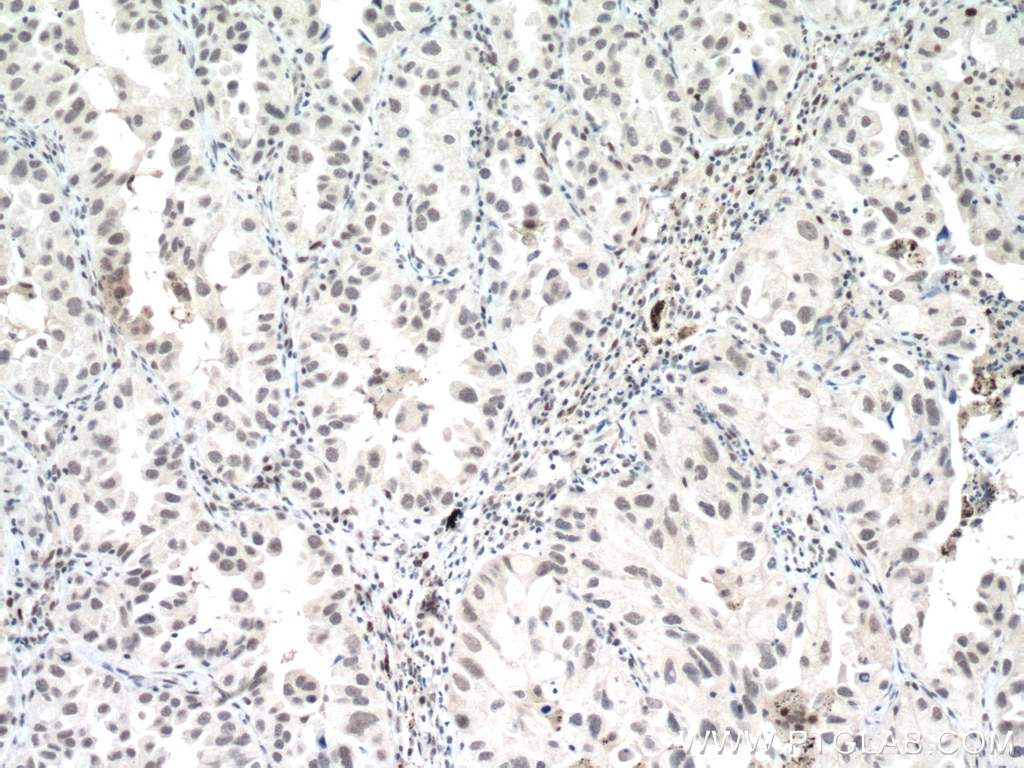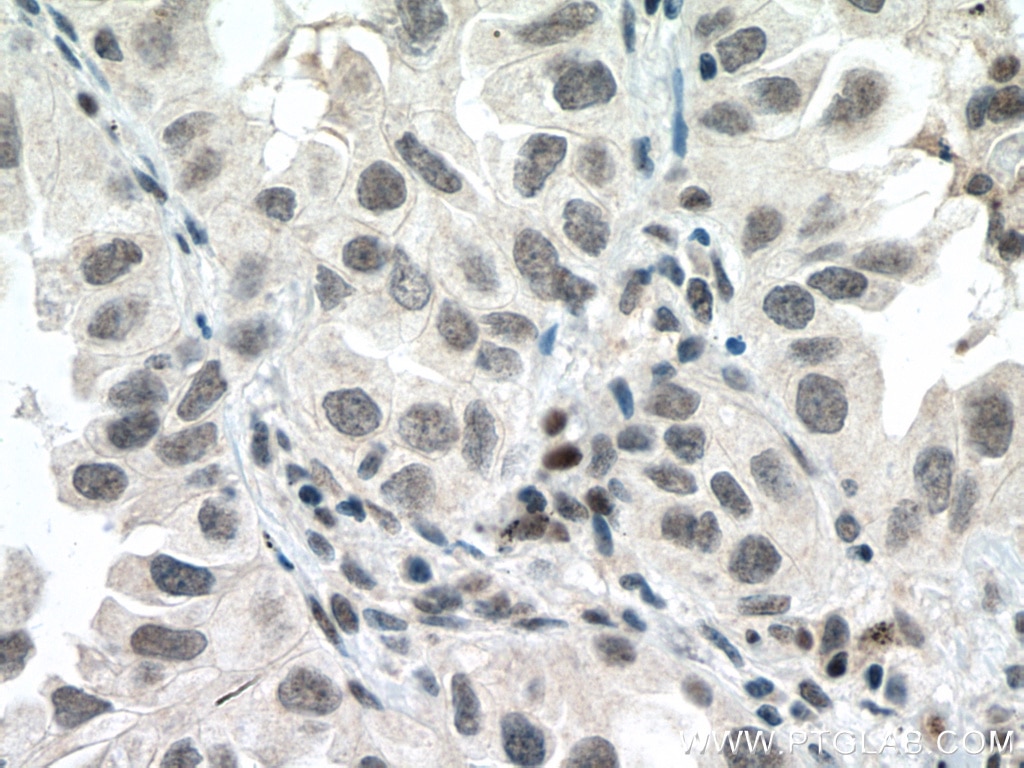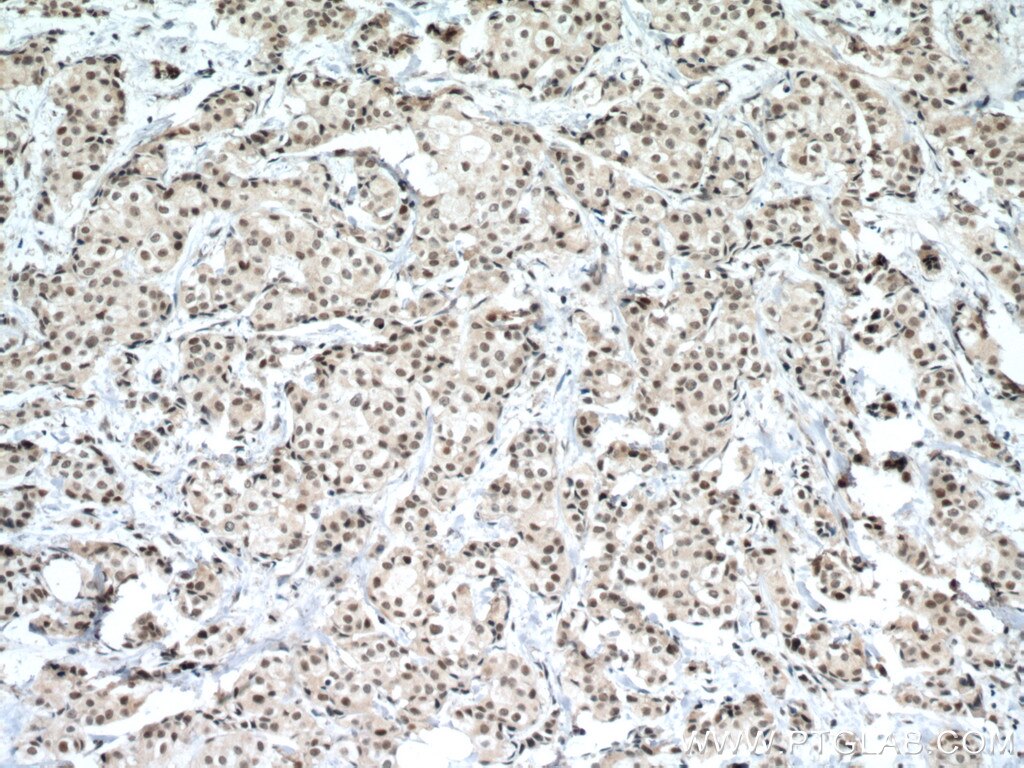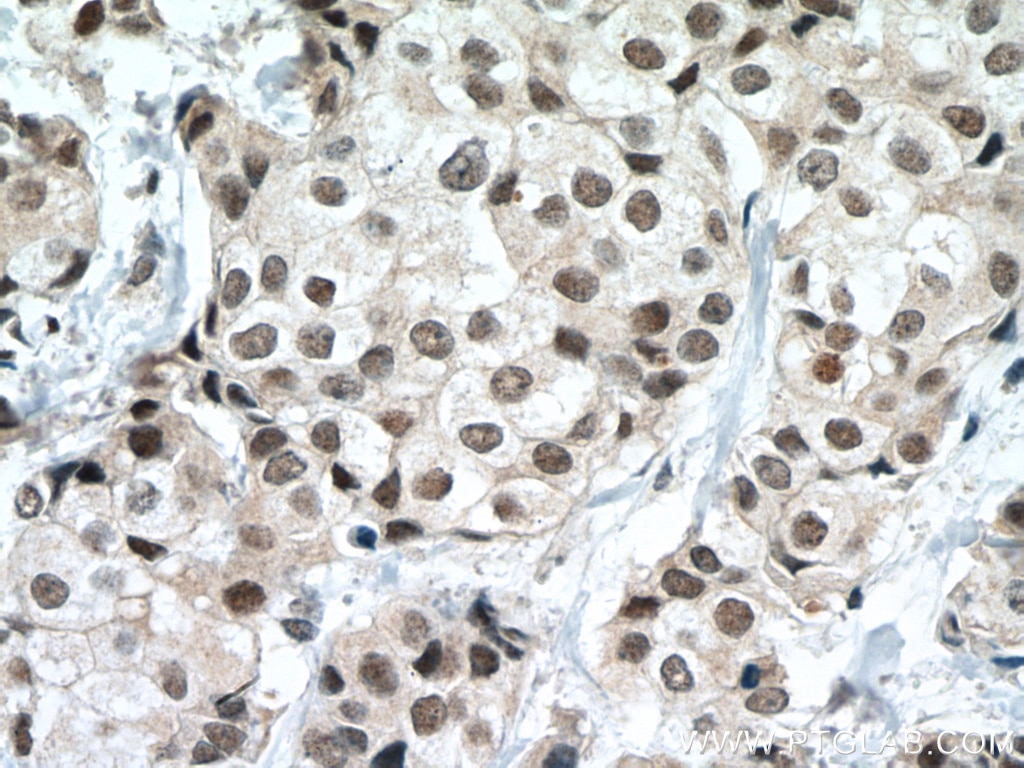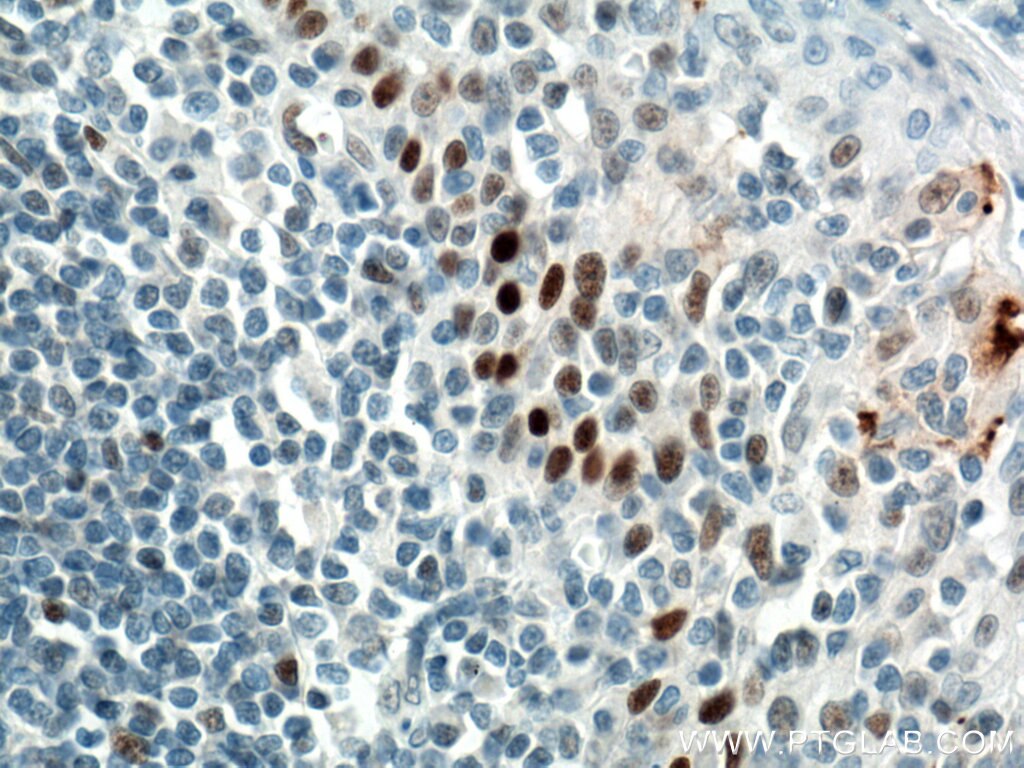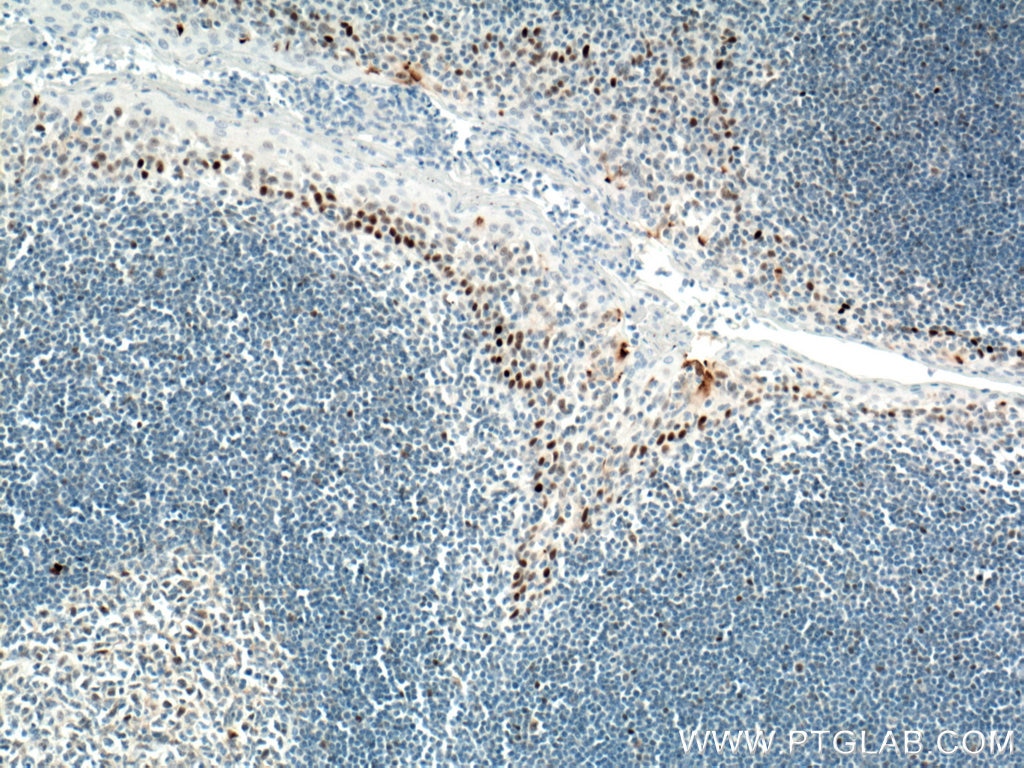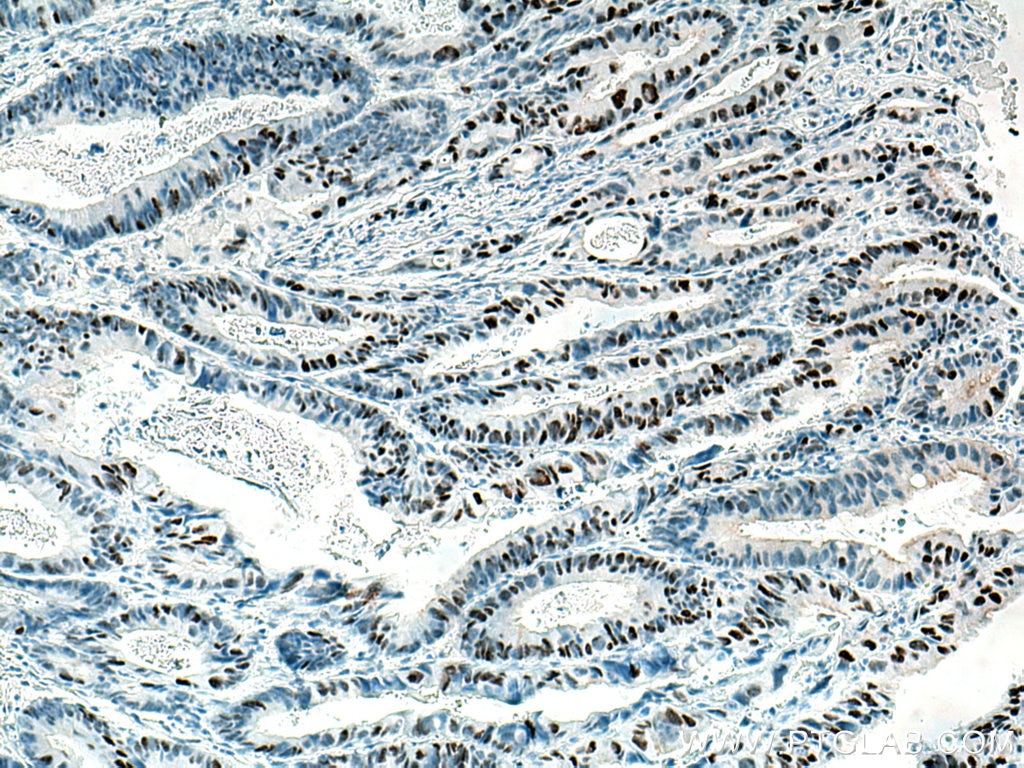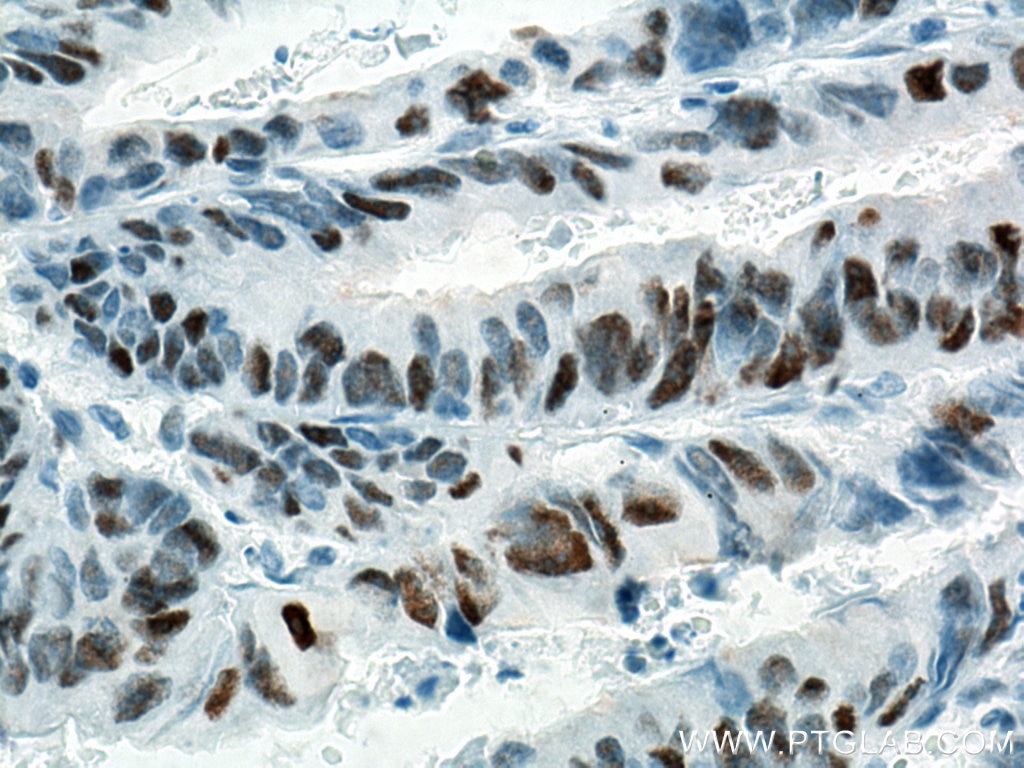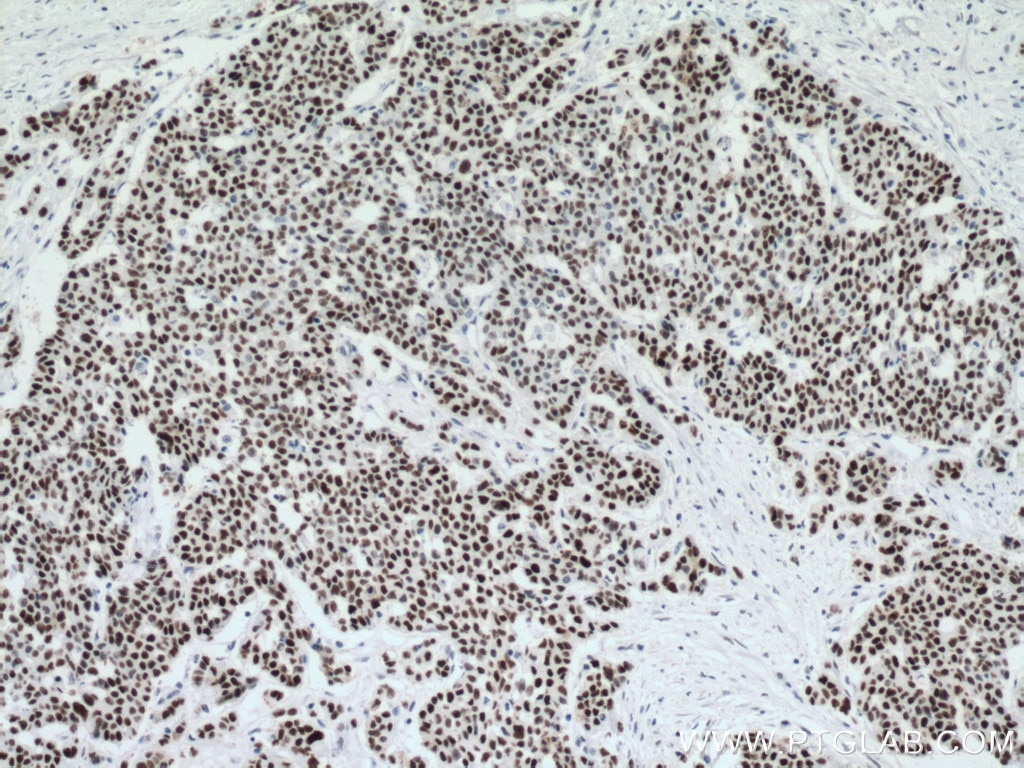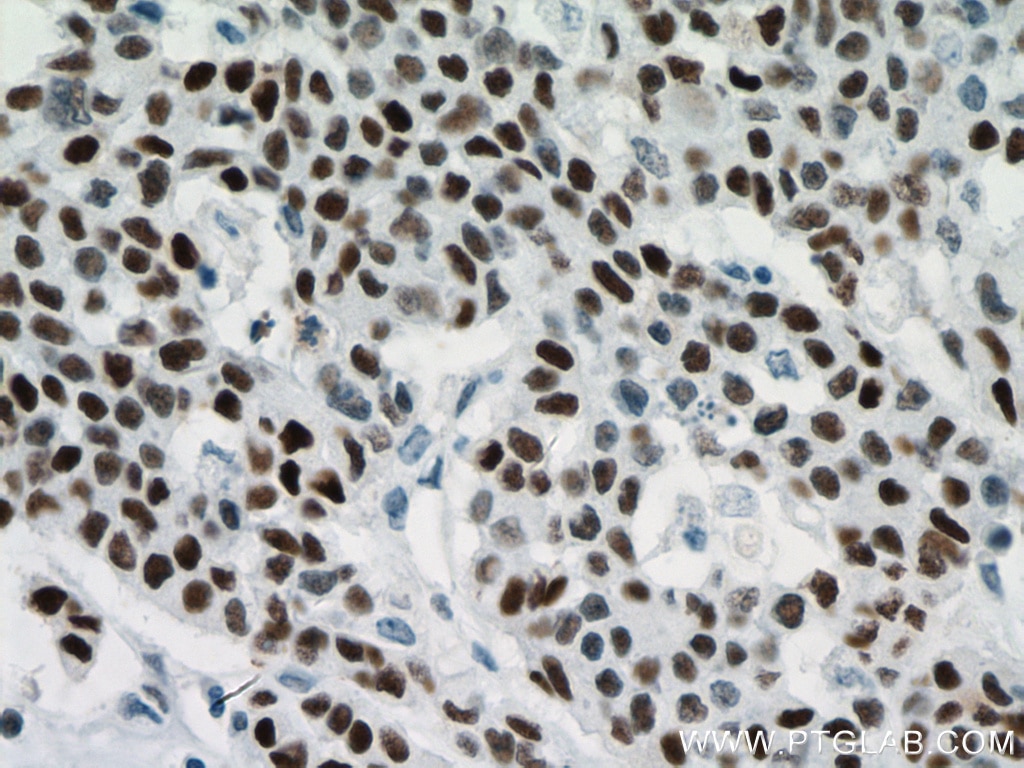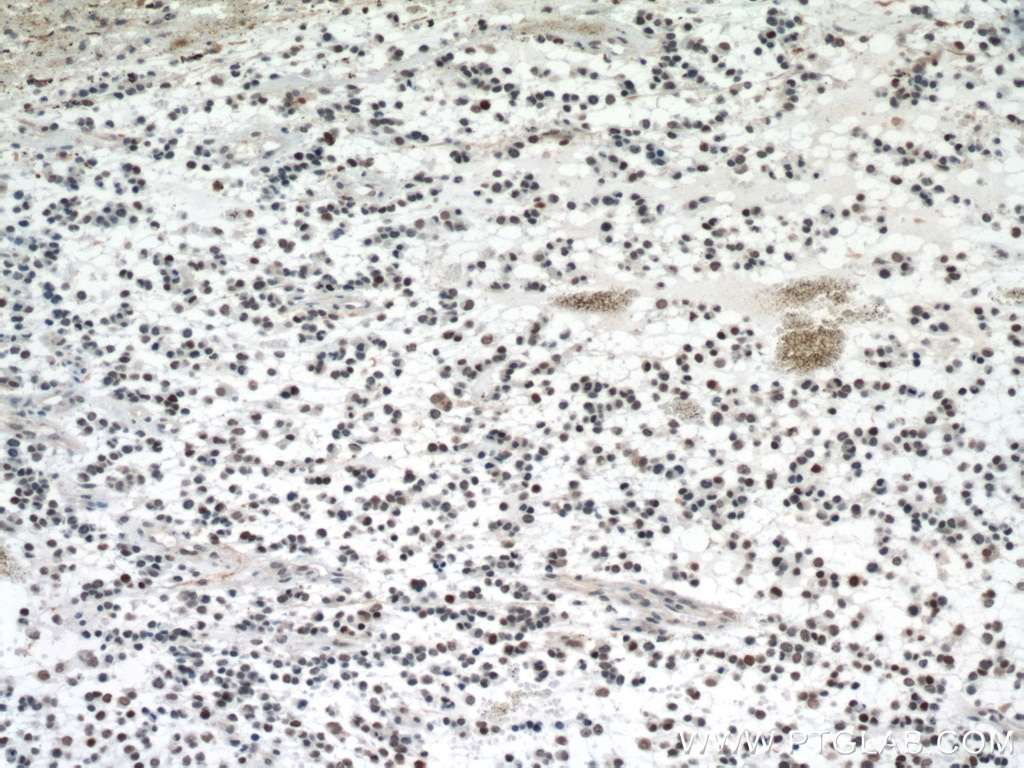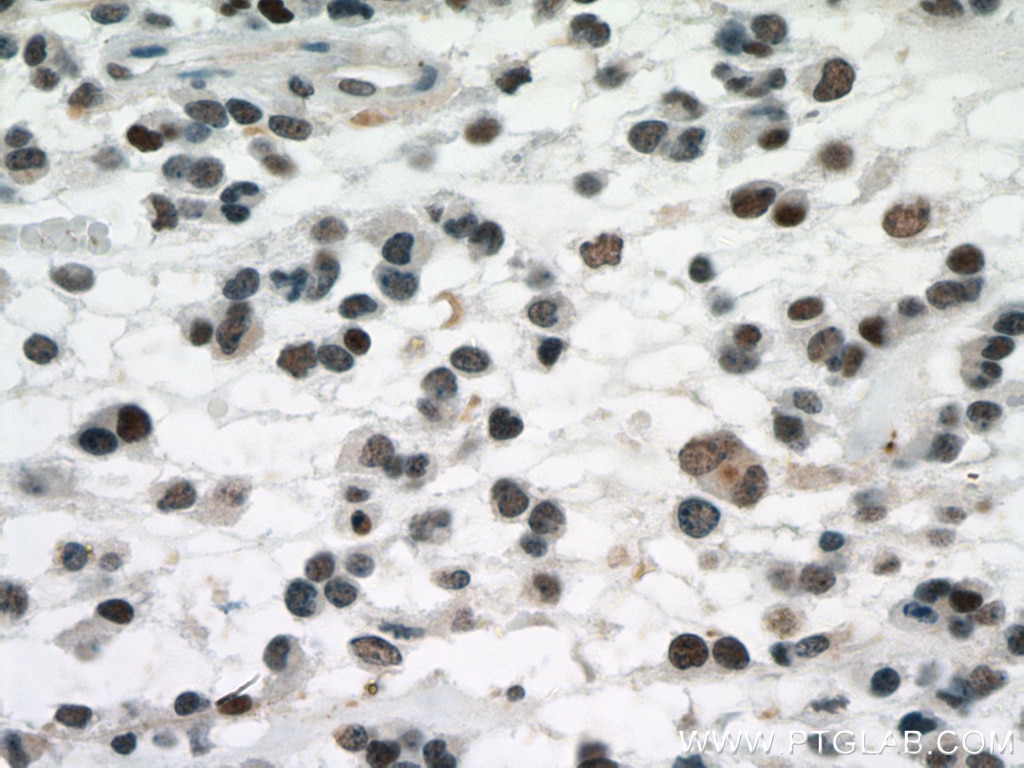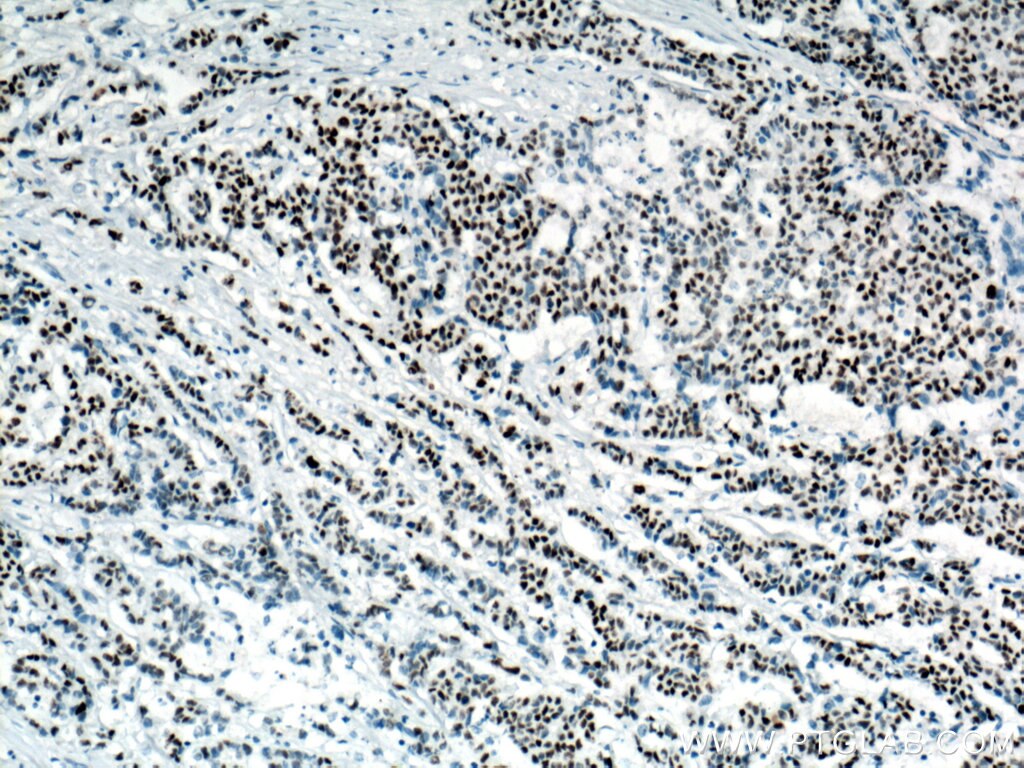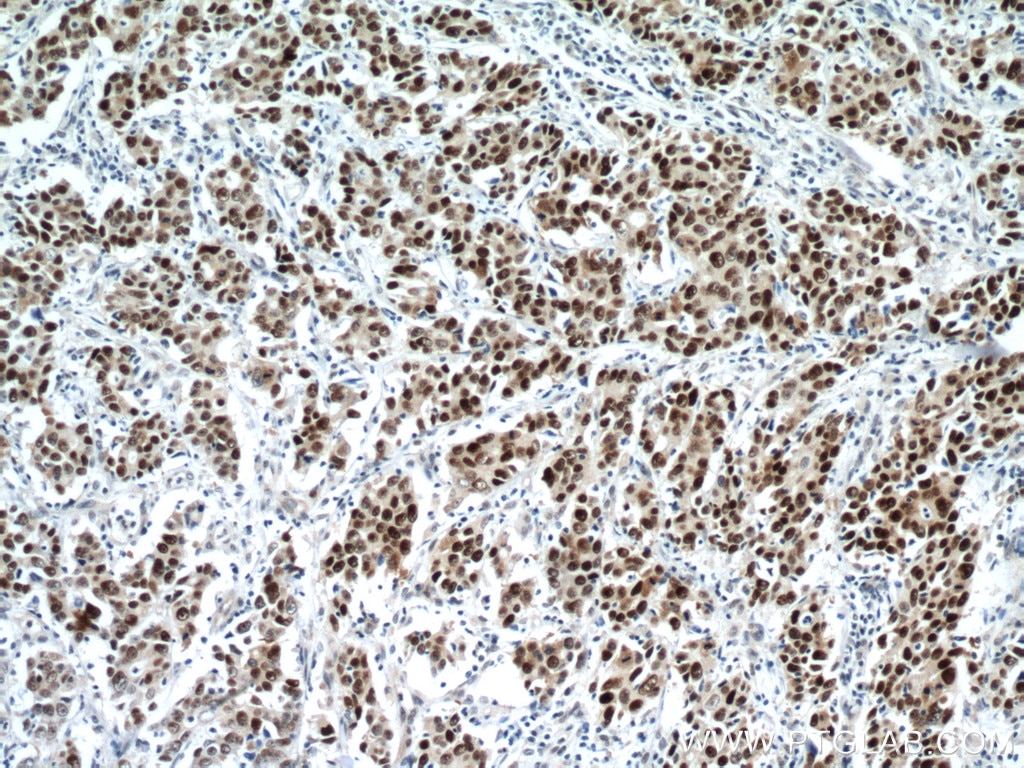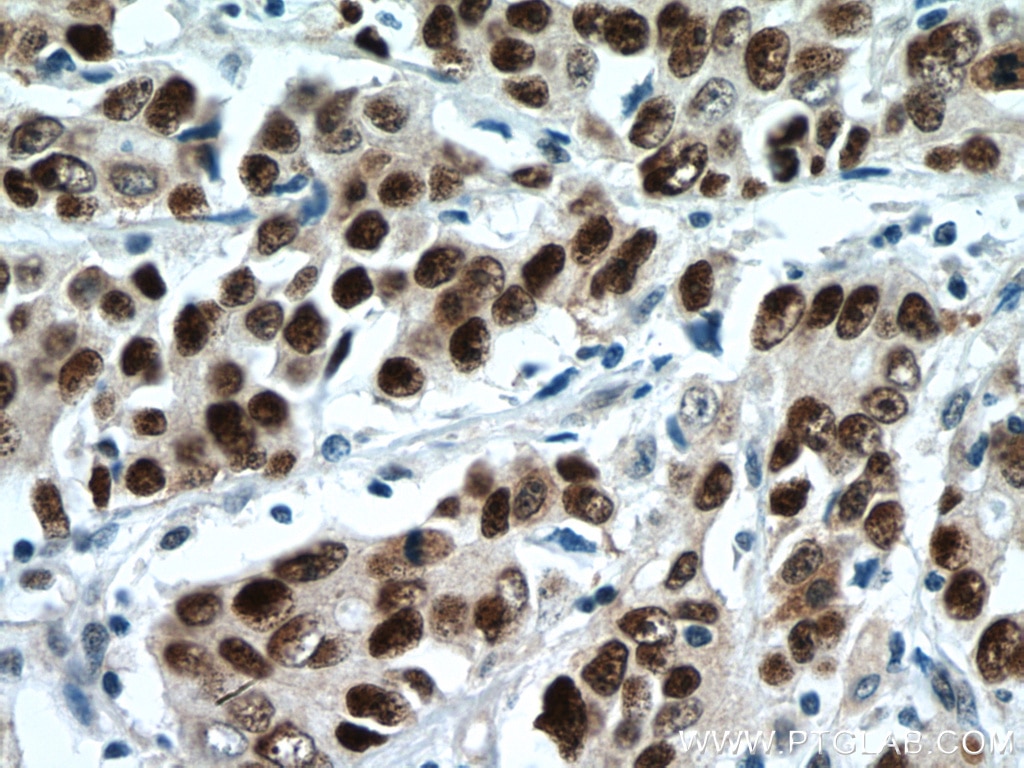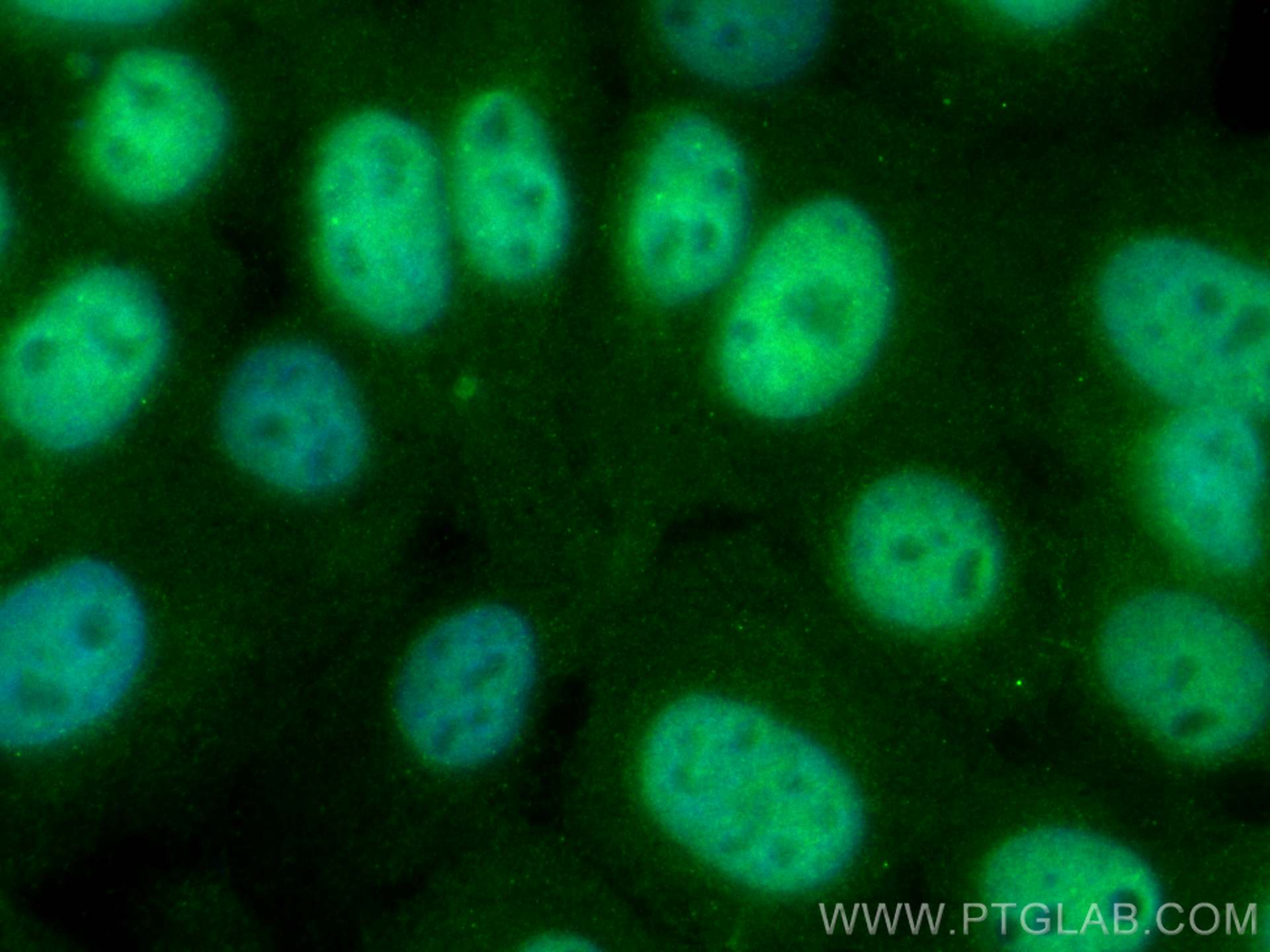- Phare
- Validé par KD/KO
Anticorps Monoclonal anti-P53
P53 Monoclonal Antibody for IF, IHC, WB, ELISA
Hôte / Isotype
Mouse / IgG2b
Réactivité testée
Humain, rat, souris et plus (4)
Applications
WB, IP, IHC, IF, CoIP, ELISA
Conjugaison
Non conjugué
177
CloneNo.
6C4B6
N° de cat : 60283-2-Ig
Synonymes
Galerie de données de validation
Applications testées
| Résultats positifs en WB | cellules Neuro-2a, cellules A375, cellules A431, cellules COLO 320, cellules HaCaT, cellules HEK-293, cellules HSC-T6, cellules HT-29, cellules ROS1728, tissu de côlon de souris, tissu de thymus de rat |
| Résultats positifs en IHC | tissu de cancer du côlon humain, tissu d'amygdalite humain, tissu de cancer de l'estomac humain, tissu de cancer du poumon humain, tissu de cancer du sein humain, tissu de gliome humain, tissu de tumeur ovarienne humain il est suggéré de démasquer l'antigène avec un tampon de TE buffer pH 9.0; (*) À défaut, 'le démasquage de l'antigène peut être 'effectué avec un tampon citrate pH 6,0. |
| Résultats positifs en IF | cellules A431, |
Dilution recommandée
| Application | Dilution |
|---|---|
| Western Blot (WB) | WB : 1:5000-1:20000 |
| Immunohistochimie (IHC) | IHC : 1:1600-1:6400 |
| Immunofluorescence (IF) | IF : 1:200-1:800 |
| It is recommended that this reagent should be titrated in each testing system to obtain optimal results. | |
| Sample-dependent, check data in validation data gallery | |
Applications publiées
| KD/KO | See 5 publications below |
| WB | See 158 publications below |
| IHC | See 20 publications below |
| IF | See 19 publications below |
| IP | See 7 publications below |
| CoIP | See 3 publications below |
Informations sur le produit
60283-2-Ig cible P53 dans les applications de WB, IP, IHC, IF, CoIP, ELISA et montre une réactivité avec des échantillons Humain, rat, souris
| Réactivité | Humain, rat, souris |
| Réactivité citée | rat, canin, Humain, Lapin, poisson-zèbre, porc |
| Hôte / Isotype | Mouse / IgG2b |
| Clonalité | Monoclonal |
| Type | Anticorps |
| Immunogène | P53 Protéine recombinante Ag0698 |
| Nom complet | tumor protein p53 |
| Masse moléculaire calculée | 44 kDa |
| Poids moléculaire observé | 53 kDa |
| Numéro d’acquisition GenBank | BC003596 |
| Symbole du gène | TP53 |
| Identification du gène (NCBI) | 7157 |
| Conjugaison | Non conjugué |
| Forme | Liquide |
| Méthode de purification | Purification par protéine A |
| Tampon de stockage | PBS avec azoture de sodium à 0,02 % et glycérol à 50 % pH 7,3 |
| Conditions de stockage | Stocker à -20°C. Stable pendant un an après l'expédition. L'aliquotage n'est pas nécessaire pour le stockage à -20oC Les 20ul contiennent 0,1% de BSA. |
Informations générales
1. What is p53?
P53 is a tumor suppressor gene that plays a role in maintaining genomic stability and controlling apoptosis. During the cell cycle, it can arrest cells at the G1/S checkpoint and activate DNA repair mechanisms. It is the most mutated gene in cancer. In unstressed cells, p53 usually exists at low levels in an inactive form, being bound to Mdm2.
2. FAQs and p53
a. I fail to detect p53 by western blotting
Basal levels of wild-type p53 in untreated cells can be low. Try to load more cell lysate and use a positive control - a lysate of cells treated with DNA-damaging agents should increase p53 levels.
b. I fail to detect p53 in some cell lines by western blotting
Various p53 mutations are present in cancer cell types. If mutations cause truncations/deletions some monoclonal antibodies may no longer recognize mutated p53. You have more chances of detecting various p53 mutants with our polyclonal antibody.
c. I can detect more than one band ~50 kDa size / different cell lines give bands at slightly different size
p53 is a subject of post-translational modifications (http://p53.free.fr/p53_info/p53_modifications.html) and more than one isoform may be expressed (http://p53.free.fr/p53_info/p53_isoforms.html). Also, it is possible that your cell line of interest expresses one allele with mutated p53 with altered molecular weight.
Protocole
| Product Specific Protocols | |
|---|---|
| WB protocol for P53 antibody 60283-2-Ig | Download protocol |
| IHC protocol for P53 antibody 60283-2-Ig | Download protocol |
| IF protocol for P53 antibody 60283-2-Ig | Download protocol |
| Standard Protocols | |
|---|---|
| Click here to view our Standard Protocols |
Publications
| Species | Application | Title |
|---|---|---|
Bioact Mater Chemo-immunotherapy by dual-enzyme responsive peptide self-assembling abolish melanoma | ||
Redox Biol Deficiency of S100 calcium binding protein A9 attenuates vascular dysfunction in aged mice | ||
Aging (Albany NY) Whole-transcriptome sequencing analysis reveal mechanisms of Yiqi Huoxue Yangyin (YHY) decoction in ameliorating D-gal-induced cardiac aging | ||
Redox Biol SSBP1 drives high fructose-induced glomerular podocyte ferroptosis via activating DNA-PK/p53 pathway. | ||
J Cachexia Sarcopenia Muscle MyD88 deficiency ameliorates weight loss caused by intestinal oxidative injury in an autophagy-dependent mechanism. |
Avis
The reviews below have been submitted by verified Proteintech customers who received an incentive forproviding their feedback.
FH Chiara (Verified Customer) (03-10-2023) | The antibody work well and was specific on the target
 |
FH Janelle (Verified Customer) (09-12-2022) | Specific to target
|
FH Allison (Verified Customer) (08-19-2019) | The antibody specifications online were easy to follow. I used the recommended dilution of antibody of 1:2000 which worked and could probably be diluted further.
|
